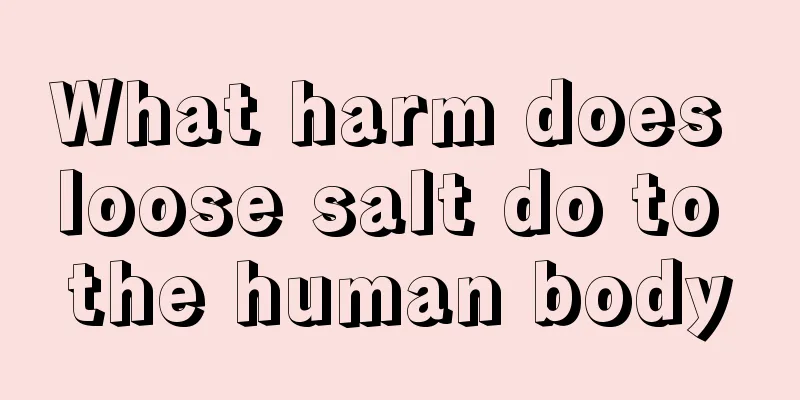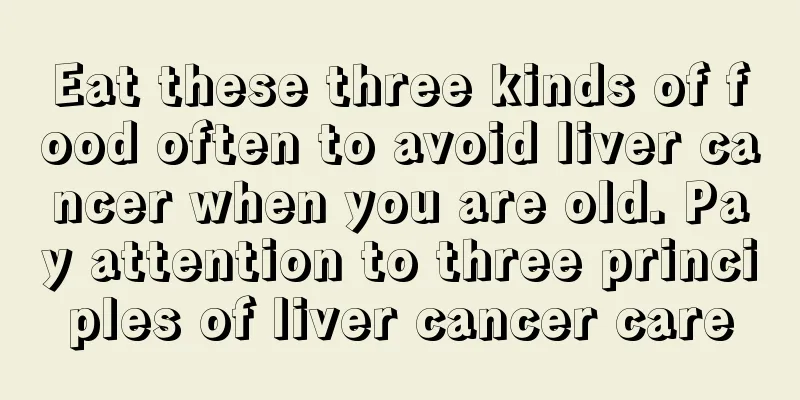What harm does loose salt do to the human body

|
The salt content in the food we eat every day varies. Salt plays an irreplaceable role in the body, but eating too much is also harmful. The salt we eat is usually bought from supermarkets. We must buy qualified table salt. Although some bulk salt is cheap, it is harmful. So what harm does bulk salt do to the human body? Loose salt is mostly industrial salt or does not contain iodine, which can cause various diseases if eaten. 1. Harm of loose salt to human body Eating too much loose salt will cause iodine deficiency. You should eat salt containing iodine. If you feel unwell, you should go to the hospital for a check-up. Only after a confirmed diagnosis can you receive symptomatic treatment. Drink more boiled water, eat light food, and exercise more. 2. The harm of long-term high-salt diet to the human body 1. Hypertension, cardiovascular disease and stroke Salt intake is related to blood pressure. A long-term high-salt diet increases the risk of high blood pressure, which in turn makes people more susceptible to cardiovascular diseases such as stroke and coronary heart disease. 2. Osteoporosis and kidney stones If dietary salt intake is excessive, the excretion of sodium will increase, which will also increase the excretion of calcium, leading to increased urinary calcium levels[10], which may lead to bone thinning and osteoporosis, and increase the risk of fractures. In addition, an increase in calcium ions in urine can also increase the risk of kidney stones. 3. Gastric cancer The European Center for Cancer Prevention conducted a survey on the relationship between dietary salt intake and gastric cancer incidence among more than 5,700 people in 24 European countries. The results showed that people who had a long-term high-salt diet had a higher incidence and mortality rate of gastric cancer. 4. Obesity If the daily salt intake is 10 grams, when it is reduced by half (to 5 grams), the amount of water consumed will be reduced by about 350 ml. Therefore, salt intake will affect how much water you drink. Generally speaking, the more salt you eat, the more water you will drink, which can lead to obesity. 5. Susceptibility to colds People who eat too much salt are more likely to catch colds. Because high concentrations of salt can inhibit the activity of respiratory cells and their ability to resist disease; it can also reduce saliva, reduce lysozyme in the mouth, and increase the chance of viral and bacterial infection in the upper respiratory tract. |
<<: How many lumbar vertebrae does the human body have
>>: What are the benefits of body acid removal
Recommend
How much does chemotherapy for testicular cancer cost
Nowadays, the charging methods of many hospitals ...
How to pickle salted duck eggs and how to make them produce oil?
The most delicious salted duck eggs are definitel...
What to do if you have a seizure
Many people may have encountered convulsions, whi...
Myocardial infarction diet
With the continuous development of science and te...
Is vinegar effective in removing dental tartar?
Many people choose to use vinegar to remove denta...
Five major clinical manifestations of bladder cancer
Bladder cancer is a common malignant tumor of the...
There is a dull pain in the lower right side of the ribs
There is a dull pain in the lower right side of t...
What are the hazards of radiotherapy for lung cancer
For lung cancer patients, the side effects of rad...
What is the significance of chemotherapy in the treatment of lung cancer? Detailed explanation of the clinical effect of chemotherapy for lung cancer
Lung cancer is a serious disease that endangers p...
Where is the soft palate
I don’t know if you have ever experienced being l...
Difference between wheat and barley
Barley and wheat are both common crops in our liv...
Smoking is one of the main causes of kidney cancer
The cause of kidney cancer is related to smoking,...
What should we pay attention to when it comes to levator ani exercises and the prostate?
The prostate is very important for men, so the he...
What are the symptoms of pulmonary hypertension
Pulmonary hypertension can easily lead to right h...
What can speed up blood circulation?
Many people are prone to various diseases due to ...









